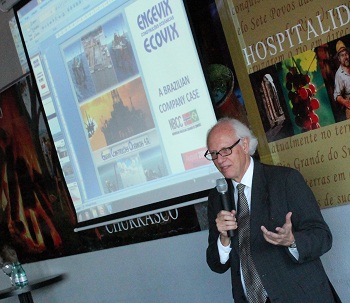“Be patient and believe in Brazil. Pre-salt will become reality”, CEO of Engevix, Mr. Gerson de Mello Almada assures.
Gerson de Mello Almada is the CEO of Engevix.The people who found their way to the NBCC lunch event on Engevix, at Fogo de Chao in Rio de Janeiro on August 28, 2013, had the pleasure of hearing the presentations and comments of CEO Gerson de Mello Almada, his close adviser Celso Parisi and business development adviser Roberto Gaensly.
Click here to see the presentations of Engevix and Ecovix.
Long traditions
Engevix is currently the largest consulting engineering company in Brazil, and this was the first NBCC event with a Brazilian EPC company, that is a company that does both engineering, procurement and construction on a project. The presentation was followed by a Q&A session and lunch.
Since the Engevix was founded in 1965, company engineers have projected and built more than 60 percent of the hydroelectric park in Brazil. In the 1990ies, the company progressed into EPC activities, and the last decade, Engevix started building FPSOs and drillships.
In 2010, the company acquired – and is now in the process of completing – the Rio Grande shipyard in Rio Grande do Sul.
“40 years ago, nobody believed Brazil would be able to produce oil in the Campos Basin. Today Petrobras has 7-8 platforms here. It became a reality. The same will happen with the pre-salt discoveries. Petrobras has been talking to the market for ten years. They need people and companies that are ready. Many companies and many countries do not believe that Brazil will succeed. But Ecovix is a good example that shows that it is possible. Look at our shipyard. There is no doubt that we are on the right track, and we will deliver on time and on cost. This is happening”, CEO of Engevix, Gerson de Mello Almada, said.
Mr. Almada was referring to the FPSO hulls and drillships being constructed by the shipyard, and also said he can understand the skepticism in the market. This was something that Roberto Gaensly also noted in his introduction.
“What people might not realize, is that this is something very significant to Brazil. This is only the beginning of the pre-salt developments. There is no way back, only forward. In business, there are always bumps and Petrobras is facing severe bumps, but Petrobras will move forward.”
Currently, 3 drillships and 8 FPSO hulls are under construction by Engevix Ecovix. The hull contract with Petrobras was signed in March 2010 and has a value of 3,5 billion USD. The drillship contract with Sete Brasil has a value of 2,4 billion USD, and the ships will be delivered in 48-66 months.
Celso Parisi has a vast experience in the oil industry, and he was actually involved in the construction of the very first offshore oil platform that was built in Brazil back in 1974. Mr. Parisi gave an overview of the organizational structure of Engevix and presented an impressive list of different projects within electric power generation, infrastructure and buildings in the Engevix portfolio.
Ecovix is the newest company in the Engevix group, established in 2010 to supply services for construction offshore equipment.
 From the left: Johnar Olsen of Scana, Roberto Gaensly and Celso Parisi from Engevix Ecovix, NBCC president Paulo Rolim and Luis Araújo of Aker Solutions.Mr. Parisi presented the shipyard facilities at the Rio Grande shipyard to the audience and said that Engevix is also looking into the market for building PSVs and AHTSs, as well as the defense market, where the company is working on a project to build patrol vessels for the Brazilian navy, together with partner ThyssenKrupp.
From the left: Johnar Olsen of Scana, Roberto Gaensly and Celso Parisi from Engevix Ecovix, NBCC president Paulo Rolim and Luis Araújo of Aker Solutions.Mr. Parisi presented the shipyard facilities at the Rio Grande shipyard to the audience and said that Engevix is also looking into the market for building PSVs and AHTSs, as well as the defense market, where the company is working on a project to build patrol vessels for the Brazilian navy, together with partner ThyssenKrupp.
“We can deliver”
Local content and “the Brazil cost” are always recurring topics – that also concerned the audience at the event on August 28.
“A vessel is 50 percent manpower and 50 percent equipment. According to our studies, Brazilian manpower is about 30 percent cheaper, so if we have 30 percent less productivity, we are on the same cost level as the industry in other countries. When it comes to equipment, tax is an important factor. It is possible to achieve the required local content percentage, and there are suppliers believing in Brazil. We have a lot of them installed to supply us locally. It all depends on the company´s will to believe – or not – in the Brazilian market”, Mr. Almada says.
According to Gerson de Mello Almada, the focus is not the international market.
“Our current target is to be competitive inside Brazil. Our shipyard is full until 2019, and export is not something we are planning for at the time.”
By Runa Hestmann Tierno, NBCC journalist
(runa.tierno@nbcc.com.br)
:


